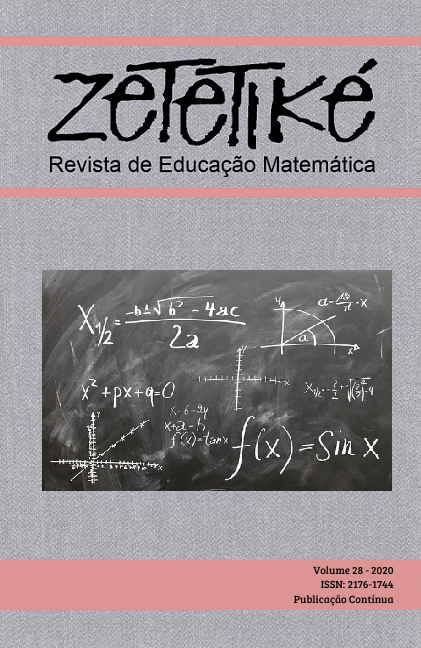Abstract
In this paper, we present a study that sought to understand how teachers recontextualize texts of the Pedagogical Intervention Program for mathematics teaching in primary school carried out by the Teresina Municipal Department of Education in a public-private partnership with "Instituto Alfa e Beto". This is a qualitative study in which data were collected through observations, documents, and interviews with two teachers who participated in the program and teach mathematics in the 5th grade. The data, analyzed in light of some concepts of sociology of Basil Bernstein and Stephen Ball, suggest that the participating teachers recontextualize the texts recommended by the program including activities designed by themselves to help prepare students for “Prova Brasil” and performing textual transformations to meet these students' performance standards.
References
Aguiar, W. R., & Oliveira, A. M. P. de. (2014). A transformação dos textos dos materiais curriculares educativos por professores de matemática: uma análise dos princípios presentes na prática pedagógica. Bolema: Boletim de Educação Matemática, 28(49), 580 - 600.
Alderton, J., & Gifford, S. (2018). Teaching mathematics to lower attainers: Dilemmas and discourses. Research in Mathematics Education, 20(1), 53-69.
Araújo, K. H., & Leite, R.H. (2019). Prêmios para escolas e professores com base no desempenho acadêmico discente: a experiência do estado do Ceará (Brasil). Revista Linhas, 20(42), 303-325.
Ball, S. J. (2000). Performativities and fabrications in the education economy: Towards the performative society. Australian Educational Researcher, 17(3), 1 - 24.
Ball, S. J. (2003). The teacher’s soul and the terrors of performativity. Journal of Education Policy, 18(2), 215 - 228.
Barrett, B. (2009). No Child Left Behind and the assault on teachers' professional practices and identities. Teaching and Teacher Education, 25, 1018-1025.
Bernstein, B. (1990). Class, Codes and Control, volume IV: the structuring of pedagogic discourse. London: Routledge.
Clapham, A. (2014). Post-fabrication and putting on a show: Examining the impact of short notice inspections. British Educational Research Journal, 41(4), 613-628.
Crecci, V. M., & Fiorentini, D. (2014). Gestão do currículo de matemática sob diferentes profissionalidades. Bolema: Boletim de Educação Matemática, 28(49), 601-620.
Creswell, J. W. (2012). Educational research: Planning, conducting, and evaluating quantitative and qualitative research (4 ed.). Upper Saddle River: Pearson Publishing.
Fanizzi, S., & Santos, V. M. (2017). Políticas públicas de formação continuada de professores dos anos iniciais em Matemática. Zetetiké, 25(3), 457-473.
Flick, U. (2014). An introduction to Qualitative Research (5. ed,). London, Sage Publications.
Freitas, L. C. de. (2012). Os reformadores empresariais da educação: da desmoralização do magistério à destruição do sistema público de educação. Educação & Sociedade, 33(119), 379-404.
Gandin, L. A., & Lima, I. G. (2015) Reconfiguração do trabalho docente: um exame a partir da introdução de programas de intervenção pedagógica. Revista Brasileira de Educação, 20(62), 663-677.
Garcia Neto, O. N. (2010). Matemática: 4º ano: caderno de atividades (Coleção IAB de matemática). Brasília: Instituto Alfa e Beto.
Hennessy, J., & McNamara, P. (2013). At the altar of educational efficiency: Performativity and the role of the teacher. English Teaching: Practice and Critique, 12(1), 6-22, 2013.
Kanes, C., Morgan, C., & Tsatsaroni, A. (2014). The PISA mathematics regime: Knowledge structures and practices of the self. Educational Studies in Mathematics, 87(2), 145–165.
Lamosa, R., & Macedo, J. (2015). A regulação do trabalho docente no contexto da reforma gerencial da educação. Revista Contemporânea de Educação, 10(20), 361 -381.
Lerman, S., & Adler, J. (2016). Policy and the standards debate: Mapping changes in assessment in mathematics. Research in Mathematics Education, 18(2), 182-199.
Melo, L. F., & Pinto Braidi, D. M. (2018). A política de bônus para os profissionais da educação no estado do Acre: concepção e normatização. Revista Teias, 19(54), 422-437.
Oliveira, A. M. P. de, & Barbosa, J. C. (2013). Tensões nos discursos de professores e as ações da prática pedagógica em modelagem matemática. Horizontes, 31(1), 21-30.
Page, D. (2016). Conceptualising the surveillance of teachers. British Journal of Sociology of Education, 38(7), 991-1006.
Povey, H., Adams, G., & Everley, R. (2017). Its influence taints all: Urban mathematics teachers resisting performativity through engagement with the past. Journal of Urban Mathematics Education, 10(2), 52-65.
Silva, L. L., & Hypolito, A. M. (2018). Avaliação, Estado e regulação: repercussões da Prova Brasil na (con)formação dos profissionais e no gerencialismo nas escolas. Arquivos Analíticos de Políticas Educativas, 26(128), 1-27.
Silva, M. S. da, Barbosa, J. C., & Oliveira, A. M. P. de. (2013). Materiais Curriculares Educativos sobre Modelagem Matemática e a recontextualização pedagógica operada por professores iniciantes. Unión: Revista Iberoamericana de Educación Matemática, 0(34), 47-67.
Singh, P. (2014). Performativity and pedagogising knowledge: Globalising educational policy formation, dissemination and enactment. Journal of Education Policy, 30(3), 363–384.
Souza, A. C. C., & Silva, M. T. da. (2015). Do conceito à prática da autonomia do professor de matemática. Bolema: Boletim de Educação Matemática, 29(53), 1309-1328.

This work is licensed under a Creative Commons Attribution-NonCommercial-NoDerivatives 4.0 International License.
Copyright (c) 2020 Zetetike


